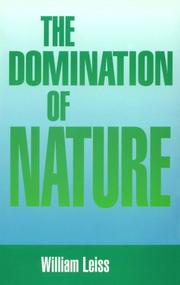| Listing 1 - 10 of 24 | << page >> |
Sort by
|

ISBN: 0773522468 0773522387 9786612859526 1282859528 0773569510 9780773569515 9780773522381 9780773522466 Year: 2001 Publisher: Montreal, Que. McGill-Queen's University Press
Abstract | Keywords | Export | Availability | Bookmark
 Loading...
Loading...Choose an application
- Reference Manager
- EndNote
- RefWorks (Direct export to RefWorks)
The essential problem is the failure to recognize that controversies over risks are "normal events" in modern society and as such will be with us for the foreseeable future. Three key propositions define these events: risk management decisions are inherently disputable; public perceptions of risk are legitimate and should be treated as such; the public needs to be intensively involved in the processes of risk evaluation and management. Leiss and his collaborators chronicle these organizational risks in a set of detailed case studies on genetically modified foods, cellular telephones, the notorious fuel additive MMT, pulp mill effluent, nuclear power, toxic substances legislation, tobacco, and the new type of "moral risks" associated with genetics technologies such as cloning. Contributors include Debora L. Van Nijnatten (Sir Wilfred Laurier University), Michael D. Mehta (University of Saskatchewan), Stephen Hill (University of Calgary), Éric Darier (Greenpeace), Greg Paoli (Decisionalysis Risk Consultants, Inc.), and Peter V. Hodson (Queen's University).
BUSINESS & ECONOMICS --- Management --- Industrial management --- Risk management --- Environmental policy --- Health risk assessment --- Environmental risk assessment --- Risk Assessment --- Risk Management --- Conservation of Natural Resources --- Canada --- Organization and Administration --- Financial Management --- Technology, Industry, and Agriculture --- Health Services Administration --- Risk --- Epidemiologic Measurements --- Environment --- North America --- Health Care --- Probability --- Technology, Industry, Agriculture --- Environment and Public Health --- Public Health --- Economics --- Americas --- Statistics as Topic --- Health Care Economics and Organizations --- Geographic Locations --- Health Care Evaluation Mechanisms --- Geographicals --- Epidemiologic Methods --- Investigative Techniques --- Quality of Health Care --- Analytical, Diagnostic and Therapeutic Techniques and Equipment --- Health Care Quality, Access, and Evaluation --- Management Theory --- Business & Economics --- Environmental aspects --- Environnement --- Gestion du risque --- Risques pour la santé --- organization & administration --- Évaluation du risque --- Protection --- Politique gouvernementale --- Évaluation --- Risques pour la sant --- Assessment, Health risk --- Health hazard appraisal --- Health hazard assessment --- Health risk appraisal --- HRA (Public health) --- Human risk assessment --- Insurance --- Risk assessment --- Precautionary principle --- Medicine, Preventive --- Public health --- Environmental health --- Business administration --- Business enterprises --- Business management --- Corporate management --- Corporations --- Industrial administration --- Management, Industrial --- Rationalization of industry --- Scientific management --- Business --- Industrial organization --- Environment and state --- Environmental control --- Environmental management --- Environmental protection --- Environmental quality --- State and environment --- Environmental auditing --- Government policy --- Organization & administration --- Risques pour la sante --- Evaluation --- Evaluation du risque

ISBN: 1282851462 9786612851469 0773562214 9780773562219 0773507248 9780773507241 0773507485 9780773507487 9781282851467 6612851465 Year: 1990 Publisher: Montreal, Que. Buffalo McGill-Queen's University Press
Abstract | Keywords | Export | Availability | Bookmark
 Loading...
Loading...Choose an application
- Reference Manager
- EndNote
- RefWorks (Direct export to RefWorks)
The publication of William Leiss' book The Domination of Nature brought him wide recognition as a perceptive and judicious author. In this brilliant new collection of essays on the philosophy of nature, Leiss argues effectively for an attitude of caring and respect for the environment rather than one of domination.
Technology --- Technological innovations --- Social aspects. --- Technology and civilization. --- Civilization and machinery --- Civilization and technology --- Machinery and civilization --- Civilization --- Social history --- Philosophy

ISBN: 1282857002 9786612857003 0773564799 9780773564794 0773511989 9780773511989 0087041610 Year: 1994 Publisher: Montreal [Que.] McGill-Queen's University Press
Abstract | Keywords | Export | Availability | Bookmark
 Loading...
Loading...Choose an application
- Reference Manager
- EndNote
- RefWorks (Direct export to RefWorks)
In Part One Leiss traces the idea of the domination of nature from the Renaissance to the nineteenth century. Francis Bacon's seminal work provides the pivotal point for this discussion and, through an original interpretation of Bacon's thought, Leiss shows how momentous ambiguities in the idea were incorporated into modern thought. By the beginning of the twentieth century the concept had become firmly identified with scientific and technological progress. This fact defines the task of Part Two. Using important contributions by European sociologists and philosophers, Leiss critically analyses the role of science and technology in the modern world. In the concluding chapter he puts the idea of mastery over nature into historical perspective and explores a new approach, based on the possibilities of the "liberation of nature." Originally published in 1972, The Domination of Nature was part of the first wave of widespread interest in environmental issues. These issues have reemerged in many industrialized countries, reinforced by planetary dynamics such as threats of global warming (or cooling) and ozone depletion. In an extensive new preface Leiss explains why his study is as relevant as ever.
Nature --- Science and civilization. --- Technology and civilization. --- Philosophy of nature. --- Human ecology. --- Ecology --- Environment, Human --- Human beings --- Human environment --- Ecological engineering --- Human geography --- Civilization and machinery --- Civilization and technology --- Machinery and civilization --- Civilization --- Social history --- Technology --- Nature, Philosophy of --- Natural theology --- Civilization and science --- History and science --- Science and history --- Science and society --- Progress --- Anthropogenic effects on nature --- Ecological footprint --- Anthropogenic soils --- Human ecology --- Effect of human beings on. --- Social aspects --- Effect of environment on --- Effect of human beings on --- Philosophy --- Influence on nature --- Philosophy of nature
Book
ISBN: 0807606464 Year: 1972 Publisher: New York Braziller
Abstract | Keywords | Export | Availability | Bookmark
 Loading...
Loading...Choose an application
- Reference Manager
- EndNote
- RefWorks (Direct export to RefWorks)
Metaphysics --- Sociology of environment --- Sociology of knowledge
Book
ISBN: 0714526460 Year: 1978 Publisher: London Boyars
Abstract | Keywords | Export | Availability | Bookmark
 Loading...
Loading...Choose an application
- Reference Manager
- EndNote
- RefWorks (Direct export to RefWorks)
Book
ISBN: 0807041610 Year: 1974 Publisher: Boston, Mass. Beacon
Abstract | Keywords | Export | Availability | Bookmark
 Loading...
Loading...Choose an application
- Reference Manager
- EndNote
- RefWorks (Direct export to RefWorks)
Book
ISBN: 1282851276 9786612851278 0773561927 Year: 1988 Publisher: Kingston [Ont.] : McGill-Queen's University Press,
Abstract | Keywords | Export | Availability | Bookmark
 Loading...
Loading...Choose an application
- Reference Manager
- EndNote
- RefWorks (Direct export to RefWorks)
Consumerism and capitalist and socialist industry have reached the point where state power is legitimatized by its ability to increase the number of commodities. A unique culture has been created in which marketing is the main social bond. Values no longer shape and condition needs, wants, desires, or preferences. Leiss draws on economics, psychology, sociology, and anthropology to show the vagueness of our thought on the relation between nature and culture, desire and reason, needs and commodities. This book raises serious, vital questions for all those concerned about the future of our present society.
Raw materials. --- Supply and demand. --- Commodity control.
Book
ISBN: 0228009863 0228009855 9780228009856 9780228009863 9780228009160 Year: 2022 Publisher: Montreal Kingston London Chicago
Abstract | Keywords | Export | Availability | Bookmark
 Loading...
Loading...Choose an application
- Reference Manager
- EndNote
- RefWorks (Direct export to RefWorks)
Canada has committed to producing net-zero greenhouse gas emissions by 2050. Canadian citizens need to understand why our most distinguished climate scientists and our senior political leaders think that we must meet this target. Canada and Climate Change explains the importance of policies that will ensure we meet the net-zero emissions target.
Climatic changes --- Environmental policy. --- Environmental policy --- Government policy --- Catastrophe. --- Risk. --- Scientist. --- economy. --- emissions. --- greenhouse-gas. --- net-zero. --- policy. --- targets.
Book
ISBN: 1280691468 9786613668400 0776619284 9780776619286 9781280691461 9780776607382 0776607383 Year: 2011 Publisher: Ottawa University of Ottawa Press
Abstract | Keywords | Export | Availability | Bookmark
 Loading...
Loading...Choose an application
- Reference Manager
- EndNote
- RefWorks (Direct export to RefWorks)
The recent global economic crisis has revealed that the prevailing risk management systems in the banking and financial sectors are utterly inadequate to protect the public from unacceptable levels of risk. Such "black holes of risk," which expose all of us to catastrophic harm, are increasingly common in the modern world. --Book Jacket.
Book
ISBN: 0714526479 Year: 1978 Publisher: London Boyars
Abstract | Keywords | Export | Availability | Bookmark
 Loading...
Loading...Choose an application
- Reference Manager
- EndNote
- RefWorks (Direct export to RefWorks)
| Listing 1 - 10 of 24 | << page >> |
Sort by
|

 Search
Search Feedback
Feedback About UniCat
About UniCat  Help
Help News
News